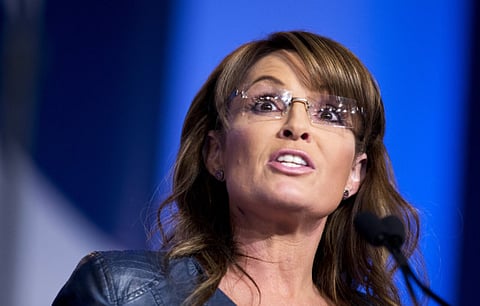Palin’s sun has begun to set in Alaska
Palin may have more influence outside Alaska these days

Alaska is known for having the economy of a petrostate, a far-flung citizenry, a large native population and unreliable polling. Oh, and Sarah Palin.
A supernova, she exploded and dissolved as a vice-presidential candidate and she was a controversial governor — supporting the infamous Bridge to Nowhere, firing people left and right, and quitting 17 months early because she felt she could do more for Alaska by talking on Fox News. And yet, the Mama Grizzly defied political gravity as she kept dressing moose, swimming with the salmon, playing the mum card and racking up sky-high favourability ratings.
Her star has faded, but the candidates she has backed have more often been winners than losers. She is complicating the re-election effort of her successor, Governor Sean Parnell, by making clear that she thinks her system for regulating oil production was better for Alaskans than his.
“Well, bless his heart,” she said on a radio talk show, recalling Parnell’s years as a ConocoPhillips lobbyist. “Perhaps that’s ingrained in him.”
Parnell has other problems. He has overseen record-breaking deficits, mishandled an investigation into a sexual assault case and has not come up with a plan for weaning the state from oil revenue.
Palin has not officially endorsed anyone, but in May, she weighed in on the side of Bill Walker, a nonpartisan candidate for governor (though a registered Republican) who got the Democratic candidate to join him as a running mate to gang up on Parnell.
Walker has “his thumb on the pulse of, I think, most Alaskans who care about the future of this state,” she said in a radio interview. “They want to see empowerment of the people.” In a recent CNN poll, Walker led Parnell 51 per cent to 45 per cent.
The marquee Senate race pits incumbent Mark Begich, the first Democrat to serve in 30 years, against Attorney General Dan Sullivan. Begich’s father, Nick, was the lone Democrat in the state legislature. Begich served as mayor of Anchorage and then won his Senate seat in 2008 after a jury convicted his opponent, Ted Stevens, of failing to report hundreds of thousands of dollars in gifts. That conviction was correctly overturned with prejudice, but not before Begich squeaked by Stevens.
There is not much ammunition for Begich to use against his opponent, Dan Sullivan, whose anti-gun-control, anti-abortion, anti-tax agenda is in sync with this very red state. He has wrapped President Barack Obama around Begich’s neck and labelled the Democrat as too liberal, pointing to his willingness to increase taxes, raise the federal minimum wage and take steps to reverse global warming. (Although native Alaskans are being forced to flee their flooded villages en masse, Sullivan says there is insufficient scientific consensus about climate change.)
However, Begich may have found a winning issue that is resonating in other races this year. Sullivan has barely lived in Alaska. He was raised in Ohio and is the son of a wealthy paint and coatings manufacturer. It helps that he married a native Alaskan, but it hurts that they graduated from Harvard, dated at Georgetown and worked much of their married life in Washington, returning to Alaska in 2009 after serving in the George W. Bush administration.
The news that Sullivan had claimed a tax break for his $1.3 million (Dh4.78 million) primary residence in Maryland almost erased the hit Begich took for a poorly conceived ad suggesting that Sullivan was responsible for a double murder and sexual assault by a felon released on Sullivan’s watch.
What Begich has going for him is his love of retail politics, his visible enjoyment of knocking on doors in Anchorage, carrying birthday cards in case there is a party going on inside. Millions have poured in from out of state to fund ads for both sides. The difference is in field operations, where Begich has outspent Sullivan 10-to-1. Sullivan has three field offices; Begich has 16.
The native vote is always the sleeping giant of Alaska politics. If turnout is high, Begich will benefit most because of his support for rural education, health care and hunting and fishing rights for natives. He has criticised Sullivan’s attempt as attorney general to reopen a court decision, allowing a revered tribal elder, Katie John, to subsistence fish on state lands.
The natives are stirring. A new video, Get Out the Native Vote, is a hipper version of the very effective ‘Rock the Vote’ message 20 years ago. Mark Trahant, the former editorial page editor of the Seattle Post-Intelligencer who teaches at the University of Alaska, said the Alaska Federation of Natives Convention last week had turned into the world’s “largest voting booth” as attendees only had to walk across the street to pick up a ballot. Early voting began last Monday.
Palin may have more influence outside Alaska these days. When she talked about running for Begich’s seat last year, one poll found her favourability rating in the state was upside down: Only 39 per cent approved of her. In the ensuing primary, she endorsed Attorney General Joe Miller against Parnell. Miller lost in a three-way race; four years earlier, Palin’s endorsement won him the Republican nomination for Senate (Lisa Murkowski went on to win as a write-in candidate). In a Public Policy Polling (PPP) survey late last month, 54 per cent of likely Alaska voters had an unfavourable view of Palin.
Lucky for both Republicans, Palin has gone to ground since a drunken brawl at a party in Anchorage last month that involved the whole family in an ugly, headline-making scene. A plurality of Alaska voters — 30 per cent — believe the Palins instigated the melee, according to the PPP poll.
When Sullivan was asked if he wanted Palin’s endorsement, he said: “I want the endorsement of everybody,” which, translated from the Inuit, means “no”.
— Washington Post
Margaret Carlson is a columnist for Bloomberg View.



